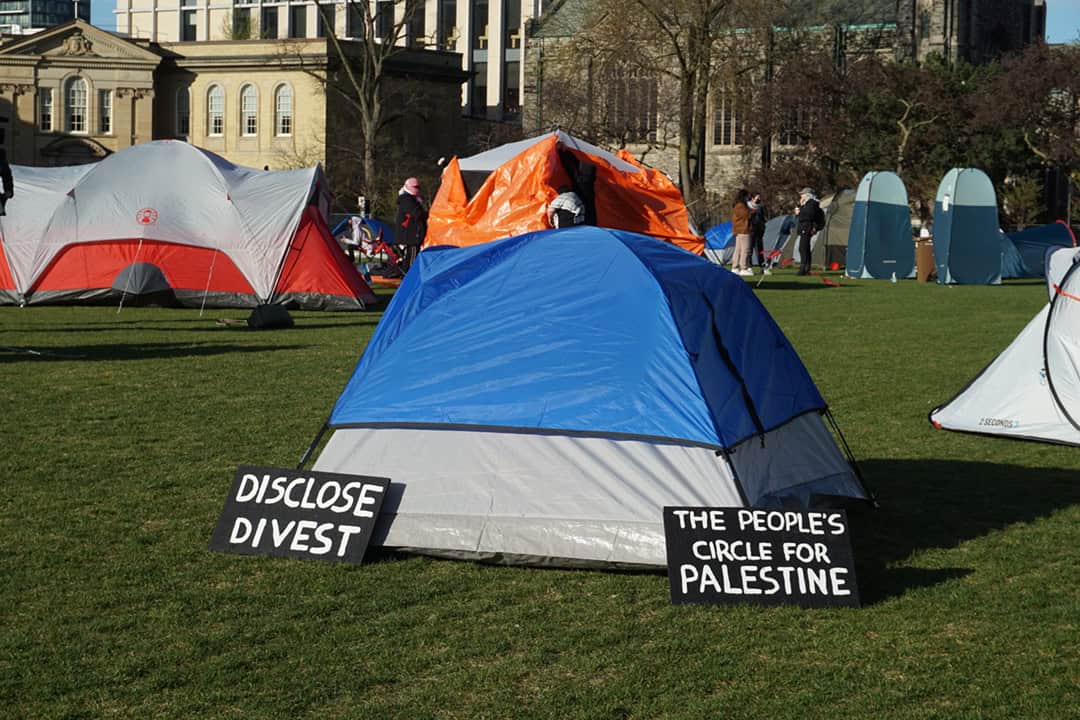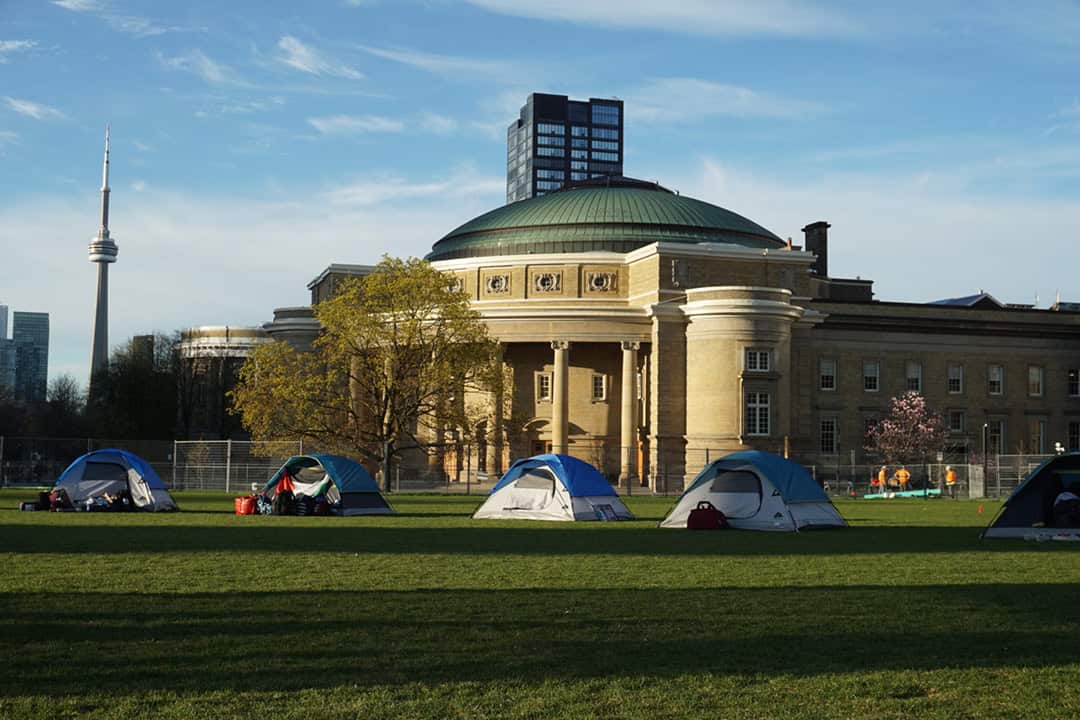Around 4:00 am on May 2, a group of 50 students broke into a gated King’s College Circle and set up tents, calling on the university to divest from companies that supply the Israeli military.
Students at seven Canadian universities, including U of T, currently have set up encampments demanding their universities cut ties with Israel or the Israeli military. As of May 2, U of T students had set up 49 tents in the centre of King’s College Circle.
The protest comes a month after about 26 students occupied Simcoe Hall, making similar demands. Today’s encampment marks nearly seven months of Israel’s war on Palestine, while the United Nations says reconstructing Gaza could cost 40 billion dollars.
“Disclose, divest”
UofT Occupy for Palestine (O4P) — the group of students who organized the protest — set up a camp they call the “People’s Circle for Palestine.”

At around 4:00 am, O4P entered King’s College Circle — which the university had gated off.
Upon starting the encampment, the organization released a statement on Instagram with three key demands for the university: disclose where U of T invests its almost four billion dollars in endowment and short-term capital assets; divest these assets from investments supplying Israeli occupation; and terminate all partnerships with Israeli academic institutions that support the violence in Gaza.
By 4:38 am, the students had set up tents in King’s College Circle and started chanting, “Lift the Siege, Let them breathe” and “Viva viva intifada, Intifada revolution.” They draped flags over the entrance to the field and on the fences that U of T had set up.
Erin Mackey — a fifth-year U of T student studying environmental justice and political science and an O4P spokesperson — told The Varsity that the encampment is joining students across North America in “calling up their universities’ complicity in this ongoing genocide.”
This comes after the International Court of Justice’s (ICJ) preliminary decision in January 2024 found it plausible that the Israeli government’s actions in its ongoing retaliatory invasion of Gaza constitute genocide.
In an email to The Varsity, a spokesperson for the university wrote that they respect the right of members to protest within the limits of the law and U of T policies. However, they wrote that the protests “must not interfere with the ability of students, faculty, librarians and staff to learn, teach, research and work on campus or disrupt or impede other university activities.”
The Spokesperson added that students who break this rule are subject to consequences under various laws and policies, including suspension.
By 6:11 am, about 150 students and faculty had entered the grounds, and 50 people were at the northeast entrance of the circle. By 7:18 am, there were two campus security vehicles and three security cars parked around the circle.
Mohamid Yassin, another O4P spokesperson, spoke to The Varsity about the group’s hopes for the encampment. “Our goal here is just to instill that the University of Toronto addresses our demands with a full unbridled commitment.”
“We haven’t had our voices heard, and people feel like finally, this is a way that the university will finally notice us,” said Yassin.
Carolyn Egan, President of the United Steelworkers (USW) Toronto Area Council, also spoke to The Varsity about their reasons for coming to the protest.
“We’ve been involved from the start with supporting the movement to stop the bombardment that’s been taking place in Gaza, to really be supportive of the Palestinian people. We’ve been in many of the demonstrations that have been taking place.”
Egan mentioned that the USW has been working with the Palestinian Youth Movement and other organizations to advocate against the war. They heard on the radio about U of T’s encampment and decided to take part in it.
In a statement to The Varsity, a university spokesperson mentioned that their preference is to start a dialogue and cited the meeting between students and U of T President Meric Gertler.
Protestors also received a letter from the university, stating that protesting would not be permitted after 10:00 pm. The protesters shared the contents of the letter around 8:30 am. However, U of T did not respond to The Varsity regarding what would happen after this deadline.
At 10:55 am, chants started again in the middle of King’s College Circle.
Around noon, in response to the letter they received, O4P took to X, formally Twitter, to say that they “fully reject the school’s attempt to deny us our constitutional right to peaceful assembly.”
“We will not be leaving until we achieve divestment, disclosure, and an academic boycott of complicit Israeli universities. The people united will never be defeated.”
They are also calling on community members to show up at 7:00 pm to help defend the encampment.
“No tents”
U of T first set up an enclosure around King’s College Circle on April 28, with signs pointing to its temporary closure for protection due to “concerns about unauthorized activity.” UTSC also posted signs on campus saying “no tents/camping on campus.”
In an email to students on April 28, Vice-Provost Students Sandy Welsh wrote that “The University respects our members’ rights to assemble and protest within the limits of U of T policies and the law.”
“Unauthorized activities such as encampments or the occupation of University buildings are considered trespassing,” wrote Welsh.
Judith Taylor, an associate professor in Women and Gender studies and sociology, spoke to The Varsity about her thoughts on the protest. “I was really alarmed when I saw the message from the university administration warning students against political expression. And [U of T] faculty have a history of teaching students how to organize their thoughts and speak for the justices that they imagine and that they hoped for,” she said.
In an open letter to Gertler, the University of Toronto Faculty Association (UTFA) criticized Welsh’s statement for being an “unreasonable, disproportionate, and premature attempt to limit the lawful and peaceful exercise of free expression.”
“The weaponizing of property rights to prohibit free speech on campus is unprecedented at the University and is of grave concern to the Association,” wrote the UTFA.
The statement also acknowledged the university being the site of many protests over the years, but has not “limited the use of those spaces by others for extended periods.”
At 1:15 pm, Welsh sent out an email to U of T faculty members, updating them on the state of the campus amid the encampment. Welsh highlighted that the university is open and that some buildings in the area have restricted access.
“Engaging in activities that contravene law or policies – such as remaining on grounds or in buildings after notice to leave, or erecting structures or barriers in outdoor spaces – can have potential consequences,” wrote Welsh.
Joining the fight
The encampment at U of T marks the latest in a series of camps that have taken over universities in Canada and the US. Students at McGill University in Montreal continue to stand their ground after a judge rejected an order to force them to leave.
Students at Western University in London, Ontario, started their camp on Wednesday, and those at the University of British Columbia in Vancouver also established protest sites.
The student movement began at Columbia University in New York City on April 17. Earlier this week, the police used force to evict the campsite at the administrators’ request. At the University of California, Los Angeles, police started removing protesters’ temporary barriers on Thursday following violent altercations between demonstrators and counter-protesters. Meanwhile, Brown University set a rare example of successfully getting administrators to agree to divestment from companies tied to the Israeli military campaign.
Counter-protest
At 4:24 pm, some of the protestors began to link arms and form a barricade at the entrance of the field, blocking people from coming in the gated area. A few minutes later, at approximately 4:30 pm, a group of about eight counter protesters gathered in front of the field’s entrance, directly in front of University College.
The counter protestors waved multiple Israeli flags, with one holding a microphone trying to yell. In response, the protestors began chanting, “Free, Free Palestine.” By 4:44 pm, the protestors blocked people from coming in and going out of the gated area.
By 5:05 pm, the counter protestors left, following the protestors’ demands for them to leave the premises. The protestors continued to chant, “U of T your hands are red, fifty thousand children dead,” and “U of T, U of T, Palestine will be free.”
According to Yassin, the group of counter protestors were part of the Jewish Defense League (JDL) — a right-wing, anti-Palestinian organization. They explained that similar Zionist groups in the US were agitating other student encampments, so they had expected the JDL to arrive.
Yassin explained that the student protestors wanted to remain “entirely peaceful,” as the JDL is known to be “very violent,” and willing to use “underhanded tactics.”
Police response
In a post on X, O4P wrote, “We expect a potential escalation this evening, so we are calling upon all community members to show up at 7 PM and help us defend our encampment.” By 7:00 pm, around 300 people gathered outside of University College to participate in a rally.
Inside the field, the organizers held up microphones and began to chant, “All the Zionists are racist, all the Zionists are terrorists,” and “Has a student revolution ever been wrong.” Those participating in the rally, outside of the field, held Palestinian flags and signs that called on the university to “divest” and “disclose,” referring to U of T’s endowments in companies that supply the Israeli military.
The rally
At 9:30 pm, Welsh released a statement addressing O4P. She emphasized that the students do not have permission to remain on the field after 10 :00 pm, as they are on private property. However, Welsh stated that the university does not intend to remove the students so long as they “remain peaceful.”
According to the statement, the university’s concerns about safety at the encampment are increasing as O4P has called on more people to join the protest and the number of attendees has increased significantly throughout the day.
Welsh also alleged that the administration had asked O4P, “on several occasions,” to identify a U of T student liaison, but they have yet to do so.
In response to Welsh’s claim, Mackey told The Varsity that they have not heard from the university administration about identifying a student liaison, but they would be “happy to provide [one].”
Welsh added that there will be a higher number of Campus Safety officers near King’s College Circle and the Toronto Police is monitoring the protest.
Editor’s note (May 2, 6:47 pm): This story has been updated to include details about the counter protest outside of University College.
Editor’s note (May 3, 7:42 pm): This story has been updated to include details about the 7 pm rally and Welsh’s statement addressing O4P.


